Coaching Tools
Free coaching tools & techniques
Coaching questions, models, tips & exercises to take your coaching skills to the next level!
30+ coaching questions for structured coaching conversations
Structure your coaching conversations with 30 free coaching questions according to the SHIFT! model:
- Specify your goal
- Honour reality
- Identify obstacles
- Find resources
- Take action
- ! Stay alert
Download them now for free and facilitate a shift in behaviour, mindset, and beliefs!
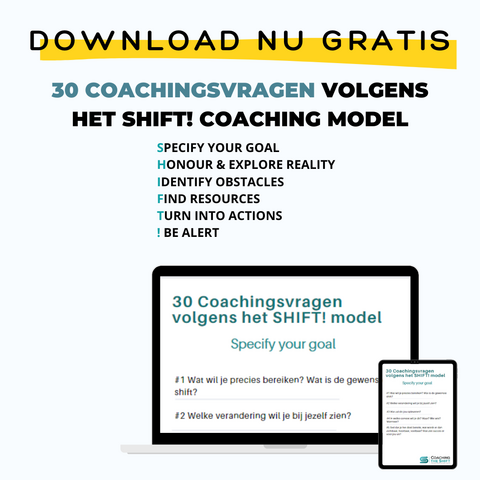
The SHIFT! coaching model places extra emphasis on sustainable change during the coaching process. Use these 30 questions to start your coaching conversations or as inspiration!
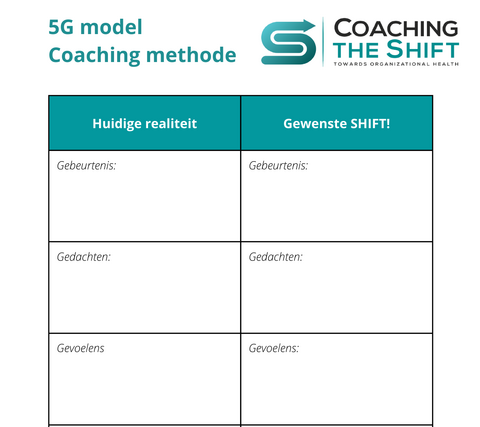
The 5G worksheet for sustainable behavioural change!
Do you want to create a sustainable shift? Start here!
- Analyse your thinking, feeling & doing
- Identify triggers in your environment
- Visualise the desired reality
- Stop, breathe & reflect
- Shift towards sustainable change
Create your own reality! Download the worksheet for free now & start your transformation today!
The 5G worksheet is based on the thinking, feeling, doing model. Analyse underlying emotions & thoughts for sustainable behavioural change in yourself or your clients!
60+ coaching questions based on McClelland's iceberg model
Stimulate reflection, awareness, and change at the levels of:
- Behaviour, knowledge, competencies
- Thoughts, beliefs, self-image
- Norms & values
- Drivers & motives
- Identity & personality
Download the free guide now and learn to coach using the iceberg model!
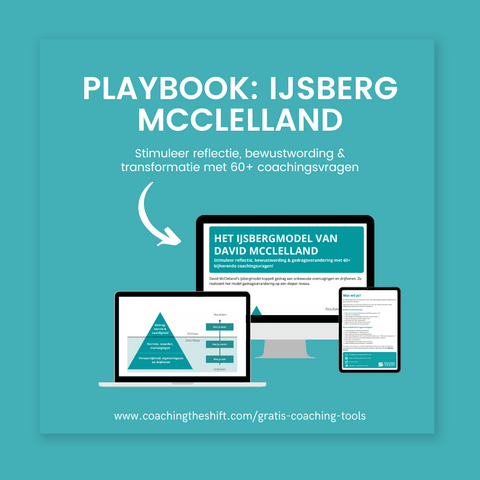
McClelland's iceberg model provides deeper insight into the invisible factors (beliefs, values, etc.) that drive the visible ones (behaviour, competencies, etc.).
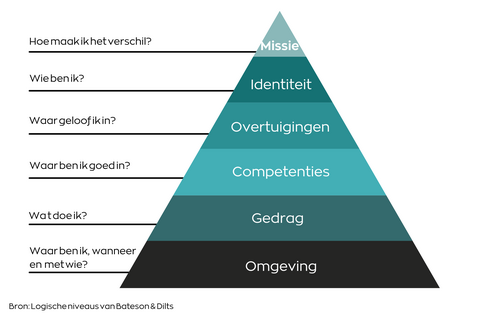
The 6 logic levels of Bateson
Bateson's pyramid is a coaching model for thinking, learning, and change! Includes:
- Explanation and exercises at each level
- Reflection model based on the logical levels
- 30+ coaching questions
- 6+ coaching exercises
Ensure sustainable change from environment and behavior to beliefs and identity!
Bateson's pyramid distinguishes 6 logical levels where change occurs. Reflect individually or with your coachee using the accompanying coaching questions and exercises!
Becoming a Coach Starter Guide
Everything you need to know to become a professional and certified coach!
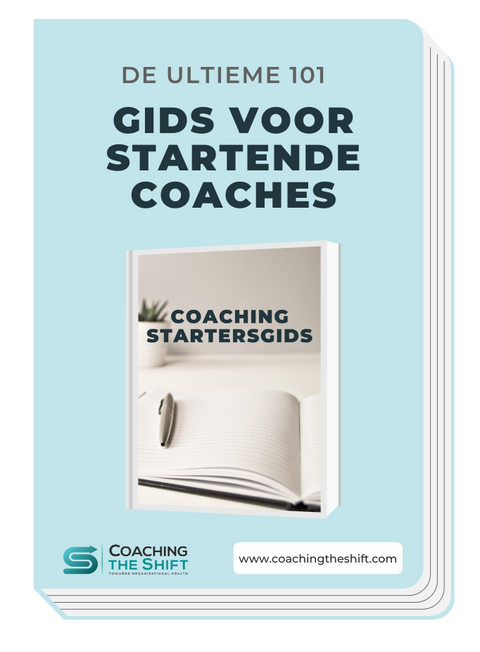
Become a Certified Coach with the Ultimate Coaching Starter Guide!
Are you aspiring to become a coach? Or are you already a coach looking to deepen your expertise in the art of coaching? In our starter guide, we answer all the questions for beginners and growing coaches!
- What is coaching?
- The difference between coaching and...
- How do I become a coach?
- Core coaching competencies
- Professional organizations for coaches
- Which trainings to become a certified coach
- The certification process by ICF
- Working as a coach: freelancers, part-timers, in the workplace
- Coaching tools for beginners
- Tips for choosing the best training!
Coaching is a craft. Learn the do's and don'ts of coaching from our experience as ICF Master Coaches with over 10,000 hours of experience coaching more than 250 coachees!
Discover Your Learning Needs with a Free Quick Scan!
Get Your Free Quick Scan Now!Coaching tips & infographics
Develop your coaching skills with practical tips & infographics!
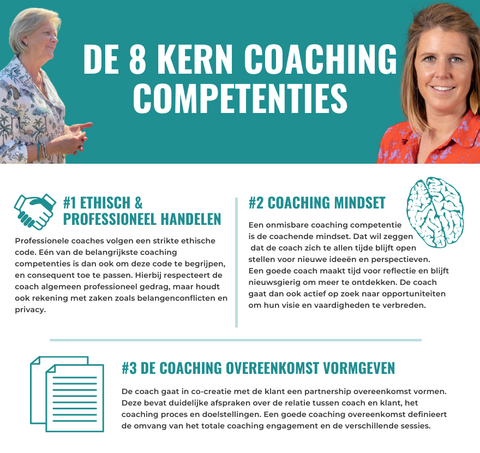
8 Core Coaching Competencies (ICF)
As a coach, you create a safe environment for others' growth. What skills does a coach need for this?
- Professionalism & ethical code as a coach
- Coaching mindset & attitude
- Active listening & presence
- Facilitating awareness & personal development
Download the infographic for free & define your personal strengths and areas for improvement as a coach!
Building a professional coaching relationship depends on the coaching skills you possess. Can you help others gain more insight? Do you establish clear agreements in the coaching process?
11 Conversation Techniques for 6 Practical Scenarios
Conversation techniques help optimize your attitude and approach during a conversation towards your end goals. For example:
- Handling resistance
- Respectful confrontation
- Generating motivation
- Building trust
Each scenario requires a different approach. Some rely on powerful questions, while others focus on non-verbal behavior.
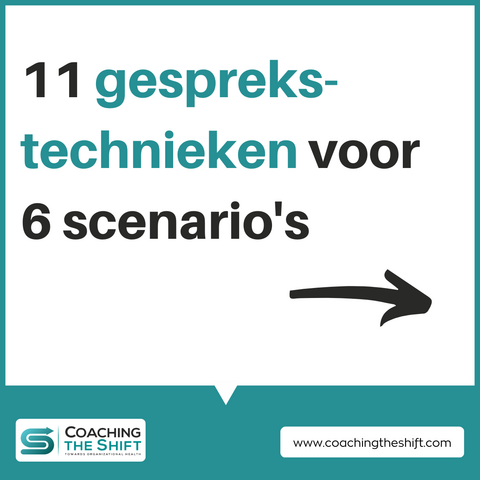
Download for free and discover 11 conversation techniques that you can apply in more than 6 different scenarios. Explore coaching tools to safely bring assumptions into the conversation and more!
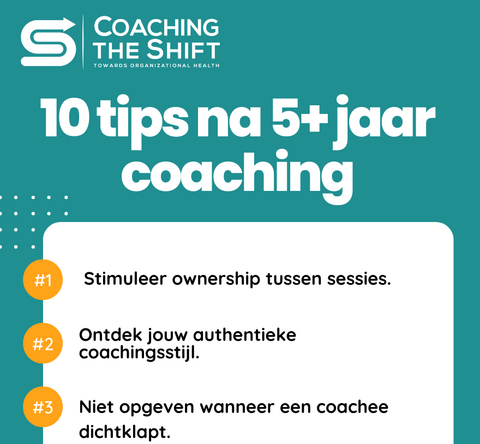
Coaching Tips from Over 5000 Conversations
While coaching tools provide direction and structure to the coaching process, they remain just one tool in the arsenal of a professional coach. What truly makes the difference? How crucial are the foundational coaching skills and mindset?
What pitfalls should you avoid as a beginner coach? As Master coaches with extensive experience to draw upon, we've compiled our top 10 tips into one infographic!
Discover 10 tips that make a difference as a coach! How do you ensure more engagement throughout a coaching process? Why shouldn't you try to be the perfect coach? How do you handle a coachee who shuts down?
Tips & pitfalls when drafting the coaching agreement & action plan
The coaching agreement and action plan are perhaps the two most important tools in the coaching process. However, mistakes can sometimes jeopardize professionalism and client relationships.
- How do you remain neutral as a coach?
- How do you measure success?
- How do you align all stakeholders?
Set yourself apart from the first intake conversation with your clients or employees!
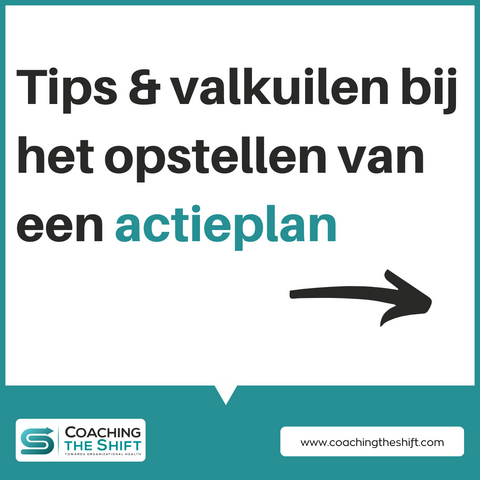
Differentiate yourself as a coach at the start of the coaching process! Discover how clear goals, agreements, and follow-ups lead to a stronger trust relationship with your coachees!
Coaching methods & models
Accelerate your personal SHIFT! with well-known coaching models & principles!
David Kolb's Learning Cycle
In this coaching model, David Kolb defines 4 learning styles within a learning cycle. Despite personal preferences, everyone goes through all phases of the cycle. Coaching exercises help to increase awareness in this process.
Single, double & triple loop learning
Behavior change occurs at 3 levels: competencies, beliefs, and identity. Learning loops are a form of feedback cycle where you adjust behavior based on results.
The Logic Levels of Bateson
Behind our behavior lies a series of invisible experiences, beliefs, values, ... This model facilitates a powerful coaching exercise that encourages self-reflection, introspection, and awareness!